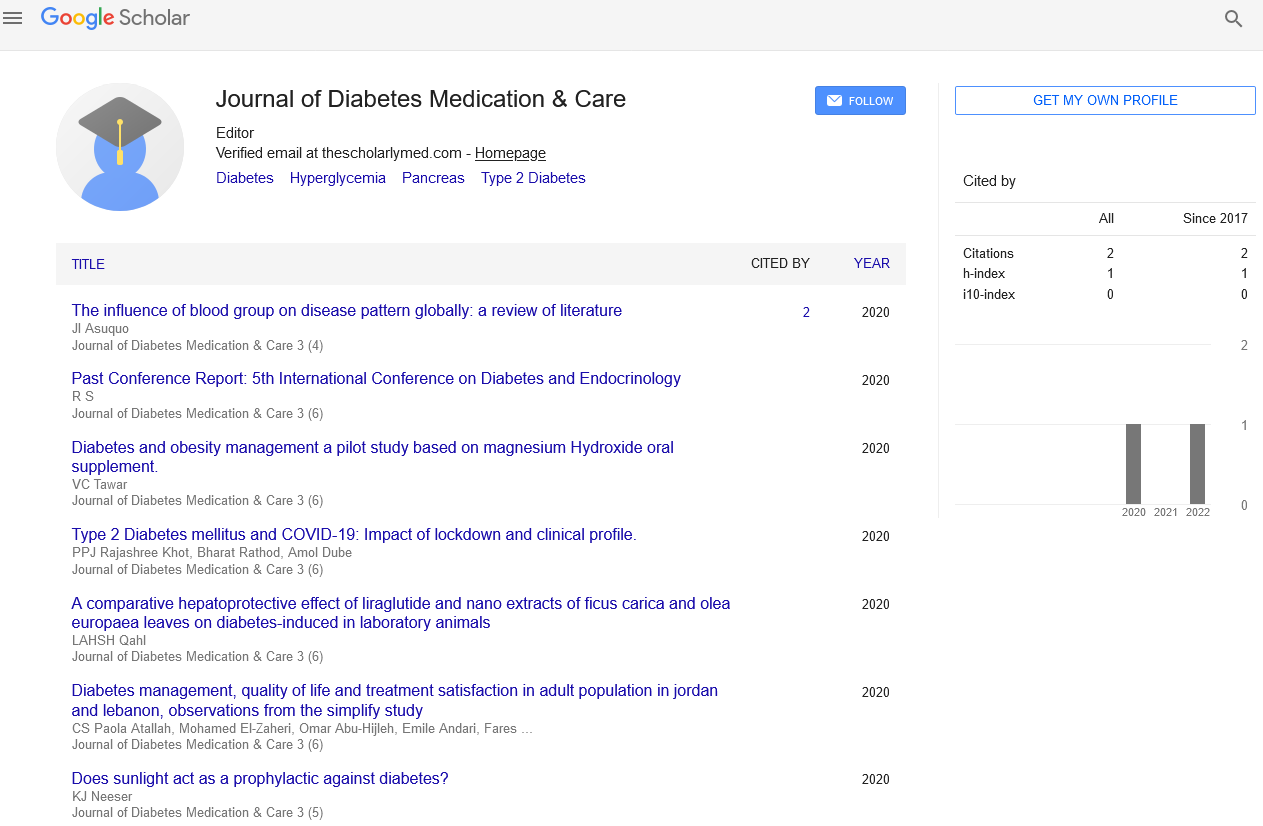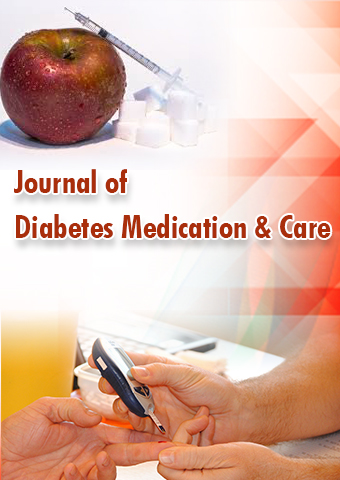Editorial - Journal of Diabetes Medication & Care (2023) Volume 6, Issue 3
Enhancing Diabetes Management: A Multidimensional Approach
Jonida*
Department of Diabetes, Albania
Department of Diabetes, Albania
E-mail: jonid@diaedu.in
Received: 05-June -2023, Manuscript No. jdmc-23-101392; Editor assigned: 08-June -2023, PreQC No. jdmc-23- 101392 (PQ); Reviewed: 23-June -2023, QC No. jdmc-23-101392; Revised: 27-June -2023, Manuscript No. jdmc-23-101392 (R); Published: 30-June -2023; DOI: 10.37532/ jdmc.2023.6(3).56-57
Abstract
Keywords
Diabetes • Chronic • Medication • Regiments • Nutrition
Diabetes management is a critical aspect of healthcare, as the prevalence of diabetes continues to rise globally. It is a chronic condition that requires comprehensive and personalized strategies to achieve optimal outcomes [1, 2]. The purpose of this editorial is to highlight the importance of a multidimensional approach to diabetes management and explore key areas that contribute to effective care. Patient-Centered Care: At the heart of successful diabetes management lies patient-centered care. Recognizing the unique needs, preferences, and goals of individuals with diabetes is essential for developing tailored treatment plans. Healthcare professionals must engage in open and meaningful communication with patients, fostering a collaborative relationship that empowers individuals to take an active role in their self-care. Lifestyle Modifications: One pillar of diabetes management is lifestyle modification [3-6]. Encouraging individuals to adopt healthy eating habits, engage in regular physical activity, and maintain a healthy weight can significantly impact glycemic control. Providing education and support on nutrition, portion control, and exercise empowers patients to make sustainable changes and improves their overall well-being. Medication Management: Pharmacological interventions play a crucial role in diabetes management [7,8]. Healthcare providers must stay abreast of the latest advancements in diabetes medications and individualize treatment plans based on patient characteristics. Effective medication management involves optimizing dosages, considering drug interactions, and promoting adherence to prescribed regimens. Regular monitoring and adjustment of medications are necessary to achieve and maintain target blood glucose levels. Continuous Glucose Monitoring (CGM) and Technological Advances: The advent of continuous glucose monitoring (CGM) and other technological innovations has revolutionized diabetes management. CGM provides real-time data on glucose levels, enabling patients and healthcare providers to make informed decisions. The integration of CGM with insulin pumps or automated insulin delivery systems offers greater precision and flexibility in insulin administration. Moreover, mobile applications and digital platforms facilitate data tracking, remote monitoring, and education, enhancing patient engagement and self-management [9]. Psychosocial Support: Diabetes management extends beyond physical aspects to encompass psychosocial well-being. Living with diabetes can lead to emotional challenges, such as stress, anxiety, and depression. Healthcare professionals should incorporate psychosocial support into care plans, recognizing the impact of these factors on treatment adherence and overall health outcomes. Encouraging support groups, counseling services, and access to mental health professionals can alleviate the psychological burden of diabetes. Integrated Care and Interdisciplinary Collaboration: Diabetes management is most effective when delivered through an integrated and collaborative approach. A multidisciplinary team, including endocrinologists, primary care physicians, diabetes educators, nurses, dietitians, and pharmacists, can provide comprehensive care. Collaborative efforts ensure a holistic evaluation of patients’ needs and enable coordination of interventions across various healthcare settings, promoting seamless transitions and continuity of care. Prevention and Early Intervention: Prevention and early intervention are critical components of diabetes management [10]. Identifying individuals at risk for developing diabetes and implementing targeted interventions can delay or prevent the onset of the disease. Public health initiatives, community outreach programs, and regular health screenings play vital roles in raising awareness, promoting healthy lifestyles, and identifying individuals with prediabetes or undiagnosed diabetes. Diabetes management requires a multidimensional approach that encompasses patient-centered care, lifestyle modifications, medication management, technological advancements, psychosocial support, integrated care, and prevention strategies. By embracing this comprehensive approach, healthcare professionals can empower individuals with diabetes to achieve optimal glycemic control, reduce the risk of complications, and improve their quality of life. Continued research, innovation, and collaboration are essential to further advance diabetes management and enhance outcomes for individuals worldwide.
References
- Anderson JW, Ward K. High-carbohydrate, high-fiber diets for insulin-treated men with diabetes mellitus. Am J Clin Nutr. 32: 2312-21 (1979).
- Booth FW, Chakravarthy MV. Physical activity and dietary intervention for chronic diseases: a quick fix after all. J Appl Physiol. 100: 1439-40 (2006).
- Roberts CK, Won D, Pruthi S et al. Effect of a short-term diet and exercise intervention on oxidative stress, inflammation, MMP-9, and monocyte chemotactic activity in men with metabolic syndrome factors. J Appl Physiol. 100: 1657-65 (2006).
- Miedema K. Standardization of HbA1c and Optimal Range of Monitoring. Scand J Clin La Investig 240, 61-72 (2005).
- Warman DJ, Jia H, Kato H et al. The Potential Roles of Probiotics, Resistant Starch, and Resistant Proteins in Ameliorating Inflammation during Aging (Inflammaging). Nutrients. 14, 747 (2022).
- Alicic RZ, Rooney MT. Diabetic kidney disease: challenges, progress, and possibilities. Clin J Am Soc Nephrol.12, 342-356 (2017).
- Koutroumpakis E, Jozwik B, Aguilar D et al. (2020) Strategies of Unloading the Failing Heart from Metabolic Stress. Am J Med. 133, 290-296.
- Wild S, Roglic G, Green A et al. Global prevalence of diabetes: estimates for the year 2000 and projections for 2030. Diabetes Care. 27, 1047-53 (2004).
- Carulli L, Rondinella S, Lombardini S et al. Review article: diabetes, genetics and ethnicity. Aliment Pharmacol Ther. 22, 16-9 (2005).
- Gregg EW, Li Y, Wang J et al. Changes in diabetes-related complications in the United States, 1990-2010. N Engl J Med. 370, 1514-1523 (2011).
Indexed at Google Scholar, Crossref
Indexed at, Google Scholar, Crossref
Indexed at, Google Scholar, Crossref
Indexed at, Google Scholar, Crossref
Indexed at, Google Scholar, Crossref
Indexed at, Google Scholar, Crossref
Indexed at, Google Scholar, Crossref
Indexed at, Google Scholar, Crossref

